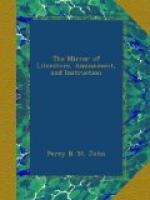The decent gravity of some of the crowd formed a strong contrast to the jocund vivacity of the majority; and this again with the important swagger of the constables, who seemed fully to appreciate the consequence which the modicum of authority dealt out to persons of their standing in society cannot fail to impart. Then the anxiety to complete their task, which the workmen who were still employed in preparing the scaffold evinced, gave another feature perfectly distinct from what had before caught my attention, while the eagerness of the inhabitant housekeepers to let “excellent places for seeing,” and of certain ambulatory pastrycooks to accommodate the rapidly increasing multitude with such delicacies as they had for sale, added to the variety, though not to the solemnity of the scene.
Some undertaker’s men were carrying coffins across the road to the prison, for the reception of the sufferers after execution. They were much pushed about, and this caused great mirth. I turned from the general display of levity with disgust. “On no account,” I mentally exclaimed, “will I remain mixed up with such a herd of heartless beings. But who am I,” I retorted on myself in the next moment, “that I should thus condemn my fellows, and ‘bite the chain of nature?’”—for what I saw was nature after all. A mob, save when depressed by a sense of peril, can never long refrain from some indications of merriment, however awful the subject of their meeting. The unfortunate Hackman, in one of his letters to Miss Ray, described himself to have been shocked by a spectacle of this sort. On the morning of the day on which Dr. Dodd suffered, Hackman was at Tyburn. While the multitude were expecting the approach of the culprit, an unfortunate pig ran among them; and the writer remarks, with indignation, that the brutal populace diverted themselves with the animal’s distress, as if they had come there to see “a sow baited,” instead of attending to behold a fellow creature sacrificed to justice.
But the pressure of the accumulating thousands was too much for me, and I asked a female, who, with an infant in her arms, stood full in my way, to let me pass. I was retiring, when the carriage of one of the sheriffs drove up to the Sessions-house, and out stepped my friend Sir Thomas ——, who, in the performance of his duty, came to superintend the last arrangements within the prison, and to give the governor a receipt for the bodies of the unfortunates who were to die.
I was instantly recognised, and the sheriff kindly complimented me with the offer of an introduction to the interior. Such politenesss was not to be withstood, and I signified my assent with a bow.
We passed up a staircase and into a well furnished and carpeted apartment. Here I was introduced to the under-sheriff, who, attended by half a dozen gentlemen, brought in, like myself, as a matter of favour, was about descending to the room in which the culprits are pinioned. Sir Thomas, who had bestowed much humane attention on the prisoners, inquired, with real solicitude, how they had passed the night. His colleague, who had just had his person embellished with the insignia of office, replied, in a lively tone. “O, very well, I understand.” He added, with infinite coolness and intelligence—“But you cannot expect men to sleep so well the night before they are hanged as they are likely to do afterwards!”




